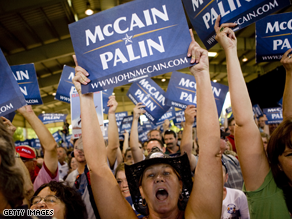"The queen had only one way of settling all difficulties, great or small. 'Off with his head!' she said without even looking around."
-- "Alice's Adventures in Wonderland"
Under the pressure of the financial crisis, one presidential candidate is behaving like a flustered rookie playing in a league too high. It is not Barack Obama.
Channeling his inner Queen of Hearts, John McCain furiously, and apparently without even looking around at facts, said Chris Cox, chairman of the Securities and Exchange Commission, should be decapitated. This childish reflex provoked the Wall Street Journal to editorialize that "McCain untethered" -- disconnected from knowledge and principle -- had made a "false and deeply unfair" attack on Cox that was "unpresidential" and demonstrated that McCain "doesn't understand what's happening on Wall Street any better than Barack Obama does."
To read the Journal's details about the depths of McCain's shallowness on the subject of Cox's chairmanship, see "McCain's Scapegoat" (Sept. 19, Page A22). Then consider McCain's characteristic accusation that Cox "has betrayed the public's trust."
Perhaps an old antagonism is involved in McCain's fact-free slander. His most conspicuous economic adviser is Douglas Holtz-Eakin, who previously headed the Congressional Budget Office. There he was an impediment to conservatives, including then-Rep. Cox, who, as chairman of the Republican Policy Committee, persistently tried and generally failed to enlist CBO support for "dynamic scoring" that would estimate the economic growth effects of proposed tax cuts.
In any case, McCain's smear -- that Cox "betrayed the public's trust" -- is a harbinger of a McCain presidency. For McCain, politics is always operatic, pitting people who agree with him against those who are "corrupt" or "betray the public's trust," two categories that seem to be exhaustive -- there are no other people. McCain's Manichaean worldview drove him to his signature legislative achievement, the McCain-Feingold law's restrictions on campaigning. Today, his campaign is creatively finding interstices in laws intended to restrict campaign giving and spending. (For details, see The Post of Sept. 17, Page A4; and the New York Times of Sept. 20, Page One.)
By a Gresham's Law of political discourse, McCain's Queen of Hearts intervention in the opaque financial crisis overshadowed a solid conservative complaint from the Republican Study Committee, chaired by Rep. Jeb Hensarling of Texas. In a letter to Treasury Secretary Henry Paulson and Fed Chairman Ben Bernanke, the RSC decried the improvised torrent of bailouts as a "dangerous and unmistakable precedent for the federal government both to be looked to and indeed relied upon to save private sector companies from the consequences of their poor economic decisions." This letter, listing just $650 billion of the perhaps more than $1 trillion in new federal exposures to risk, was sent while McCain's campaign, characteristically substituting vehemence for coherence, was airing an ad warning that Obama favors "massive government, billions in spending increases."
The political left always aims to expand the permeation of economic life by politics. Today, the efficient means to that end is government control of capital. So, is not McCain's party now conducting the most leftist administration in American history? The New Deal never acted so precipitously on such a scale. Treasury Secretary Paulson, asked about conservative complaints that his rescue program amounts to socialism, said, essentially: This is not socialism, this is necessary. That non sequitur might be politically necessary, but remember that government control of capital is government control of capitalism. Does McCain have qualms about this, or only quarrels?
On "60 Minutes" Sunday evening, McCain, saying "this may sound a little unusual," said that he would like to replace Cox with Andrew Cuomo, the Democratic attorney general of New York who is the son of former governor Mario Cuomo. McCain explained that Cuomo has "respect" and "prestige" and could "lend some bipartisanship." Conservatives have been warned.
Conservatives who insist that electing McCain is crucial usually start, and increasingly end, by saying he would make excellent judicial selections. But the more one sees of his impulsive, intensely personal reactions to people and events, the less confidence one has that he would select judges by calm reflection and clear principles, having neither patience nor aptitude for either.
It is arguable that, because of his inexperience, Obama is not ready for the presidency. It is arguable that McCain, because of his boiling moralism and bottomless reservoir of certitudes, is not suited to the presidency. Unreadiness can be corrected, although perhaps at great cost, by experience. Can a dismaying temperament be fixed?






 Today, the White House released a statement criticizing Congress’s
Today, the White House released a statement criticizing Congress’s 

